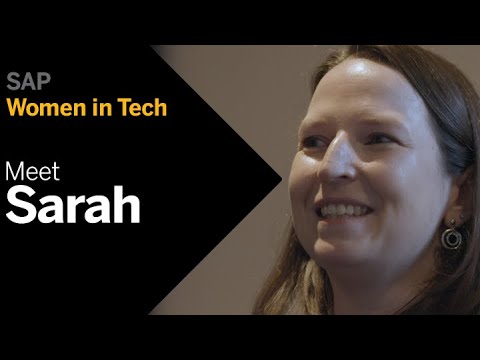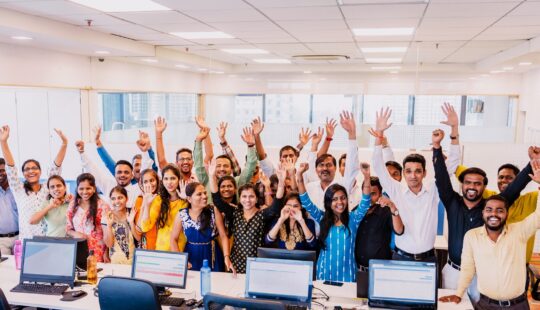Sarah Detzler has loved numbers ever since she can remember. At the age of six, she knew what she wanted to do when she grew up – study mathematics.
Whenever she mentioned her dream to her family and other people, their response was always the same: “You’re just a little girl, you can’t do that, don’t you want think about something else?” Although it was clear from her schoolwork that she was talented, people still doubted her abilities. Everyone, apart from her teacher, would tell her that studying math was a bad idea. Reactions like these were a constant source of frustration for Sarah: “You have pull through that, even though it’s quite hard work. I knew that’s what I really wanted to do, and that’s why I moved forward, no matter what anyone else said. And now I’m pretty glad that I did.”

Video produced by Natalie Hauck and Alexander Januschke
In fact, Sarah completed a doctorate in mathematics and is now a data scientist at SAP. It is her job to help customers make the most of their data, gain insights, and create predictions, enabling them to make better business decisions. “Basically, I’m living the dream I had as a little girl – I get to talk about mathematics the entire day,” she says.
Beating Stereotypes with Humor
Even as a professional, Sarah still encounters stereotyping. She is often the only woman in the room at customer meetings. Sometimes, on being introduced to clients, they automatically assume that one of her male colleagues must be Dr. Detzler the data scientist. “Humor is the best way of handling those situations,” Sarah notes. “Knowing your stuff helps too. When I hold a presentation, after the first five minutes no one has any doubt that I am the data scientist in the room.”
The fact that data and numbers offer a neutral and objective perspective strikes a chord with Sarah – especially because she has experienced bias and is acutely aware of it. Erik Kandel, a neuroscientist and Nobel laureate, estimated that between 80% and 90% of our mind works unconsciously, which means that most of our cognitive processes are based on unconscious conclusions. Sarah says: “Getting this neutral look from the data and seeing that there really is a bias and we can do something about it, or seeing, reflected from the data, how wrong our bias is, that’s something that really excites me and that I didn’t see in any other job.”
Teamwork with a Superhero
Sarah works full-time, her husband part-time. He stayed at home to look after their daughter for the first year after she was born. “It was a natural decision for us, since I was keen to return to work and he enjoys working part-time,” Sarah explains. Though they share tasks, her husband takes on most of the childcare and housework. “My husband is my superhero,“ she says. “We are a great team, the three of us, and this is the only way this can work.”
Being able to do her job from home and fit her hours around caring for her child makes life a lot easier for Sarah and her family. “I really appreciate the flexibility, since it allows me to balance work and family, and spend a lot of time with my daughter,” she adds.
Inspiring Girls to Think Big
She often thinks back to when she was six years old and mad about math. If only there had been female role models to follow and who she could point to and say that women are mathematicians too. But there were hardly any. At university, she was one of just two women on her undergraduate course, and later one of only three PhD students. It was a situation that left Sarah feeling isolated. That is why she encourages young girls whenever she can. “I want to say to them: ‘other women have made it and you can too.’”
Sarah is keen for her daughter to grow up knowing that there are no barriers. She can be an ABAP developer in the cloud, become a data scientist, or embark on a different technical career. “If she wants to do something else, that’s also perfectly fine, but I want it to be her decision. And for her to know that she can do whatever she wants in life.”
SAP Women in Technology
“As a woman working for SAP, you are a ‘woman in tech,’ regardless of what you have studied or graduated in,” says Christine Regitz, head of the company’s global initiative, SAP Women in Tech. The new Women in Tech series covers the successes and opportunities woman have had and the clichés and challenges they’ve encountered. Some entered the IT industry after studying computer science, others via very different routes. Let their stories inspire you!



